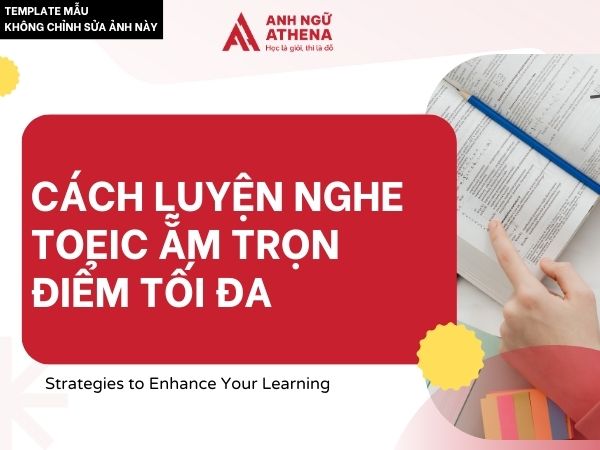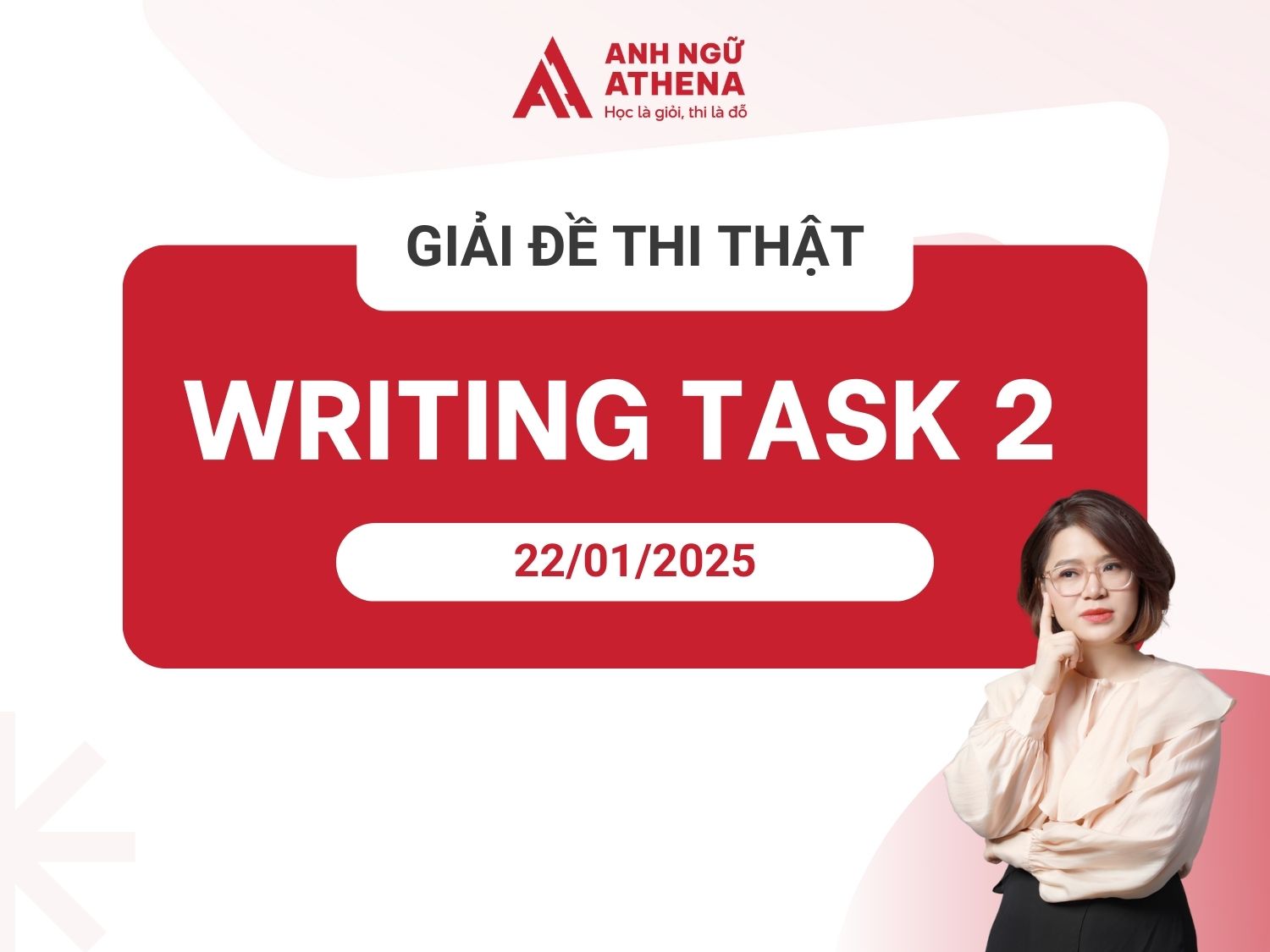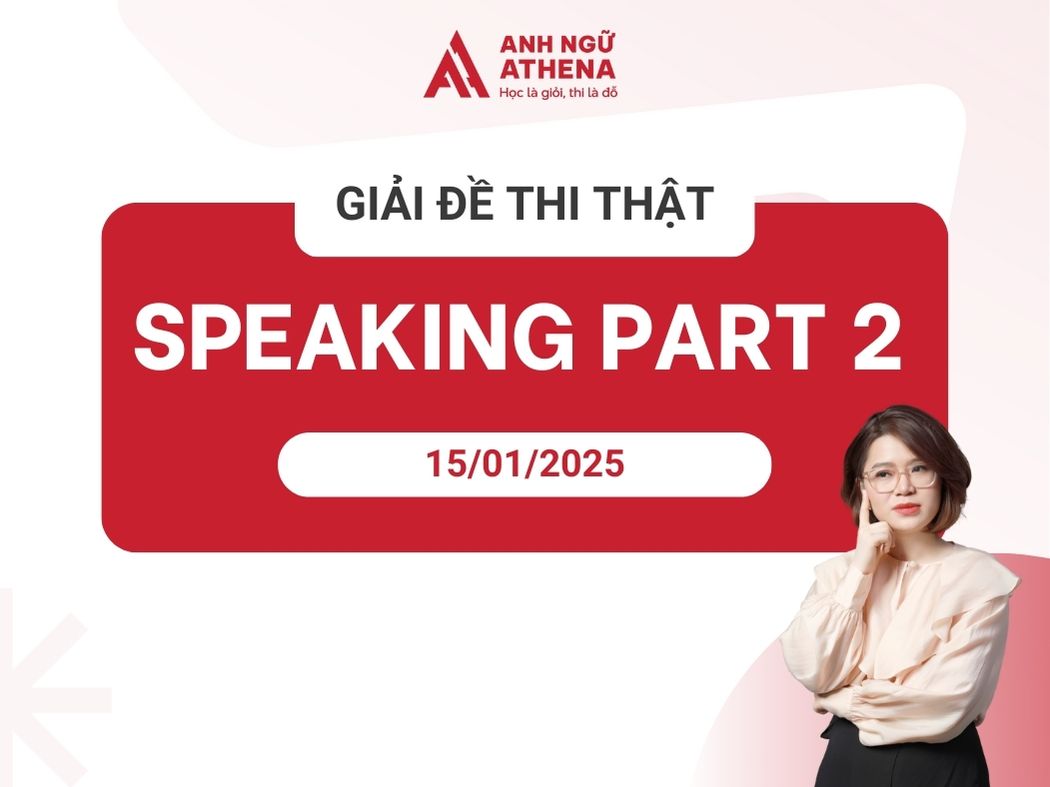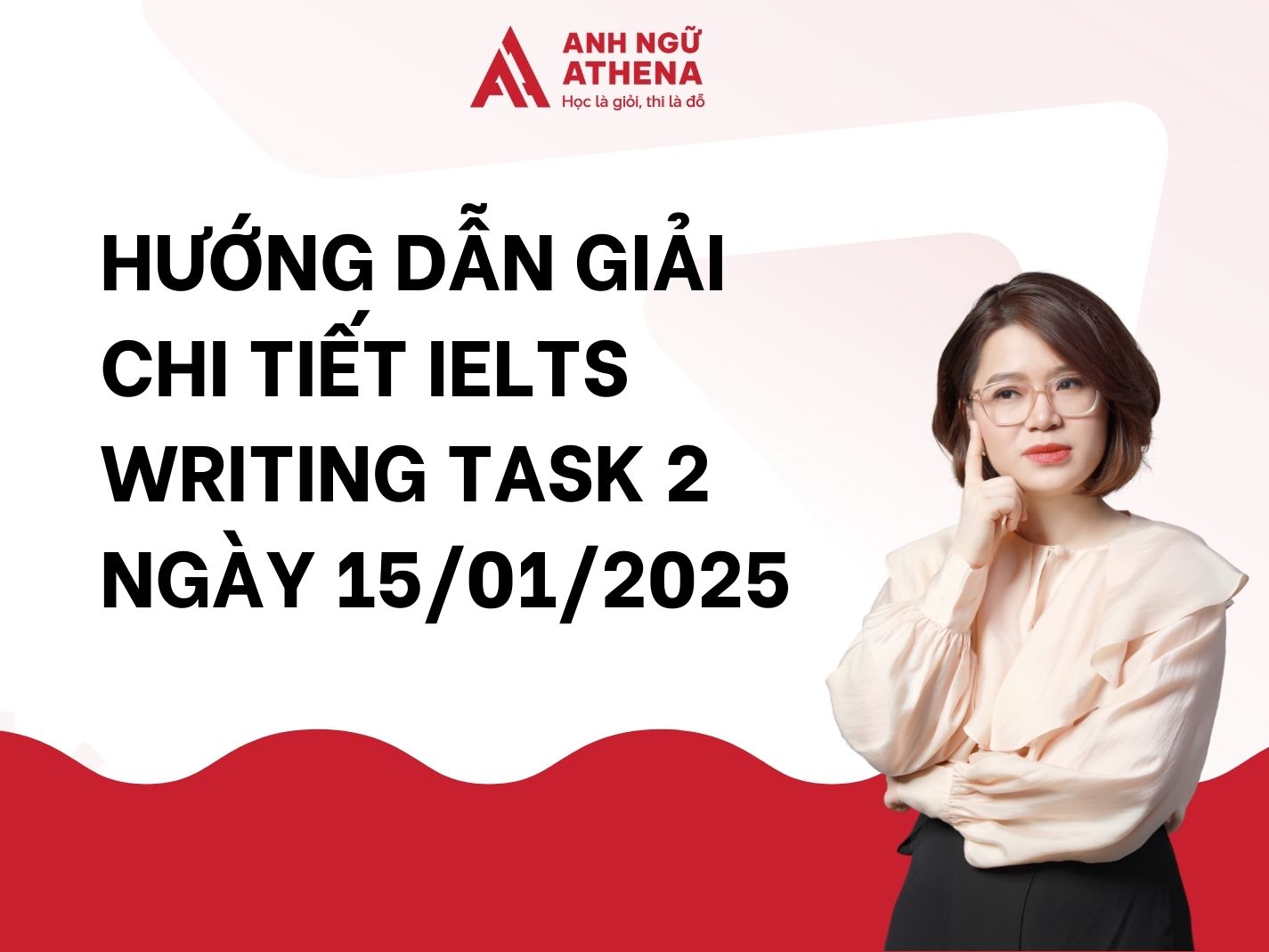Bộ tài liệu được biên soạn bởi đội ngũ biên tập viên giáo trình tài liệu Anh ngữ Athena với mong muốn cập nhật kiến thức các cấu trúc trong TOEIC reading năm 2024 sát đề thi thật nhất. Hy vọng tài liệu hữu ích này sẽ hỗ trợ các bạn trong quá trình ôn luyện – chinh phục bài thi.
>> Xem thêm: Lộ trình chinh phục TOEIC
>> Xem thêm: Bộ tài liệu học TOEIC từ mất gốc
>> Xem thêm: Bộ từ vựng TOEIC Reading

BỘ CẤU TRÚC TOEIC READING
1. S + V + too + adj/adv + (for someone) + to do something:
Too… to được dùng để diễn tả điều gì vượt quá khả năng của ai đó, quá mức cần thiết hoặc một việc không có khả năng xảy ra. Khi đó câu sẽ mang nghĩa phủ định.
Ví dụ:
She was too tired to walk.
Cô ấy đã quá mệt đến nỗi không thể đi bộ.
It was too cold to go out.
Trời đã quá lạnh đến nỗi không thể đi ra ngoài.
The tea was too hot for me to drink.
Trà quá nóng đến nỗi tôi không uống được.
Her behaviour was too rude for me to tolerate.
Cách hành xử của cô ta quá thô lỗ đến nỗi tôi không thể chịu được.
2. S + V + adj/ adv + enough + (for someone) + to do something:
Enough…to được dùng để diễn tả điều gì đủ cho ai đó làm gì
Ví dụ:
She is old enough to get married.
Cô ấy đã đủ tuổi để kết hôn.
The child isn’t tall enough to reach the ceiling.
Đứa trẻ không đủ cao để chạm tới trần nhà.
They are intelligent enough for me to teach them English.
Họ đủ thông minh để tôi dạy tiếng anh cho họ.
He didn’t drive slowly enough for us to keep pace with.
Anh ấy đã không lái xe đủ chậm để chúng tôi theo kịp.
3. S + V + so + adj/ adv + that + S + V:
(Quá… đến nỗi mà…)
Ví dụ:
This box is so heavy that I cannot take it.
Chiếc hộp này quá nặng đến nỗi tôi không thể mang nó lên được.
He speaks so soft that we can’t hear anything.
Anh ấy nói quá nhỏ đến nỗi chúng tôi không thể nghe được gì.
He had so much money that he didn’t know what to do with it.
Anh ta có quá nhiều tiền đến nỗi anh ấy không biết làm gì với nó.
It was so big a house that all of us could stay in it.
Đó là một ngôi nhà lớn đến nỗi tất cả chúng tôi đều ở được trong đó.
4. S + be/ V + such + (a/an) + adj + N + that + S + V:
(Quá… đến nỗi mà…)
Ví dụ:
It was such an amazing sight that we’ll never forget it.
Đó là một cảnh tượng thú vị đến nỗi chúng tôi sẽ không bao giờ quên được nó.
This is such difficult homework that it took me much time to finish.
Bài tập về nhà khó đến nỗi tôi mất nhiều thời gian mới làm xong.
He bought such a lot of books that he didn’t know where to put them.
Anh ta mua nhiều sách đến nỗi không biết để chúng ở đâu.
It is such a heavy box that I cannot take it.
Chiếc hộp này quá nặng đến nỗi tôi không thể mang nó lên được.
Bạn bị mất gốc tiếng Anh đã lâu? Bạn ôn thi TOEIC, luyện thi TOEIC rất chăm chỉ nhưng chưa hiệu quả? Tham khảo ngay các khóa học TOEIC để luyện thi TOEIC một cách hiệu quả tại đây 
5. Have/ get + something + done (past participle):
(nhờ ai hoặc thuê ai làm gì…)
Ví dụ:
Jill had the roof repaired yesterday.
Jill đã thuê/hoặc nhờ được ai đó sửa cái mái nhà ngày hôm qua.
Her father get her to do her homework.
Bố cô ấy đã dạy cô ấy làm bài tập về nhà.
They are having a new house built next Tuesday.
Họ đang nhờ người xây ngôi nhà cho mình vào thứ Ba tới.
I will get my hair cut next week.
Tôi sẽ đi cắt tóc vào tuần tới.
6. It + be + time + S + V (-ed, cột 2) / It’s +time +for someone +to do something:
(đã đến lúc ai đó phải làm gì…)
+ It’s time + S + V-ed/P2: đã đến lúc … phải làm gì
Mặc dù động từ ở mệnh đề chính được chia ở thì quá khứ tuy nhiên trong cấu trúc it’s time thì động từ này mang nghĩa ở thì hiện tại hoặc tương lai, mà không mang tính chất của thì quá khứ.
Ví dụ:
It’s time Linda went home.
Đã đến lúc Linda đi về nhà.
It’s time I bought a new hat.
Đã đến lúc tôi mua chiếc mũ mới.
+ It’s time + (for sb) + to + V-inf ….: đã đến lúc … phải làm gì
Ví dụ:
It’s time for us to have breakfast.
Đã đến lúc chúng ta ăn sáng.
It’s time for us to go to school.
Đã đến lúc chúng ta đi học.
Lưu ý: Một số cấu trúc khác với It’s time
+ It’s about time + S + V-ed/P2/ It’s about time + for + sb + to + V-inf
Ví dụ:
It’s about time Min and Landy left.
Đã đến lúc Min và Landy phải rời đi rồi.
It’s about time for us to hand in our assignments.
Đã đến lúc chúng ta phải nộp bài tập.
+ It’s high time + S + V-ed/P2/ It’s high time + for + sb + to + V-inf
Ví dụ:
It’s high time he found a job.
Đã đến lúc anh ấy phải đi tìm một công việc rồi.
It’s high time for them to join the meeting.
Đã đến lúc họ phải tham gia cuộc họp.
7. It + takes/took+ someone + amount of time + to do something:
(Mất bao nhiêu thời gian để làm gì)
Có 2 cách sử dụng cấu trúc It takes:
+ Để chỉ khối lượng thời gian cần thiết đối với bất kỳ ai để thực hiện, hoàn thành công việc nhất định. Khối lượng thời gian đó có thể là ước chừng hoặc là con số cụ thể.
+ Để chỉ khối lượng thời gian cần thiết đối với một đối tượng cụ thể để thực hiện, hoàn thành công việc nhất định.
Ví dụ:
It takes years to learn to play guitar.
Cần nhiều năm để học chơi guitar.
It took me one hour to cook.
Tôi dành một giờ để nấu ăn.
It takes Jill 10 minutes to put on her makeup.
Jill dành 10 phút để makeup.
It takes us 30 minutes to walk to school.
Chúng tôi mất 30 phút để đi tới trường.
8. To prevent/stop + someone/something + From + V-ing:
(ngăn cản ai/cái gì… làm gì…)
Cấu trúc “prevent/stop” được dùng để trình bày một nguyên nhân nào đó khiến cho một người hoặc một việc không thể làm/ xảy ra.
Ví dụ:
The fog prevented/stopped us from going home.
Sương mù ngăn cản chúng tôi không thể đi về nhà.
Nobody can prevent/stop us from getting married.
Không ai có thể ngăn cản chúng tôi kết hôn
He prevented/stopped us from parking our car here.
Anh ngăn cản chúng tôi đậu xe ở đây.
His back injury may prevent/stop him from playing in tomorrow's game.
Chấn thương lưng của anh ta có thể ngăn cản anh không chơi trận đấu ngày mai.
9. S + find+ it+ adj to do something:
(thấy… để làm gì…)
Ví dụ:
I find it very difficult to learn about English.
Tôi thấy quá khó để học tiếng anh.
They found it easy to overcome that problem.
Họ thấy vấn đề này quá dễ để vượt qua.
He finds it unpleasant to work in a noisy place.
Anh ấy thấy khó chịu khi làm việc ở một nơi ồn ào.
The board found it slow to continue working with these machines.
Hội đồng quản trị thấy nó chậm để tiếp tục làm việc với những cái máy này.
10. To prefer + Noun/ V-ing + to + N/ V-ing:
(thích cái gì/ làm gì hơn cái gì/ làm gì)
+ S + prefer + N1 + to + N2 (thích cái gì hơn cái gì)
Ví dụ:
I prefer this dress to the one you wore yesterday.
Tôi thích chiếc váy này hơn chiếc Bạn đã mặc ngày hôm qua.
I prefer tea to coffee.
Tôi thích trà hơn cà phê.
+ S + prefer + V-ing + to + V-ing (thích làm cái gì hơn cái gì)
Ví dụ:
I prefer flying to travelling by train.
Tôi thích đi máy bay hơn đi tàu.
They prefer playing badminton to playing football.
Họ thích chơi cầu lông hơn chơi bóng đá.
11. Would rather (‘d rather) + V (infinitive) + than + V (infinitive):
(thích làm gì hơn làm gì)
Ví dụ:
She would play games than read books.
Cô ấy thích chơi điện tử hơn đọc sách.
I’d rather learn English than learn Biology.
Tôi thích học Tiếng anh hơn môn sinh học.
He would rather eat at home than go to a restaurant.
Anh ấy thích ăn ở nhà hơn là đến nhà hàng.
Mike would rather drive motorbike than walk home.
Mike thích đi xe máy hơn là đi bộ về nhà.
12. To be/get Used to + V-ing:
(quen làm gì)
Được dùng với nghĩa là bạn đã từng làm việc gì đó rất nhiều lần hoặc đã có kinh nghiệm với việc đó rồi, vì vậy nó không còn lạ lẫm, mới lạ hay khó khăn gì với bạn nữa.
Ví dụ:
I am used to getting up early in the morning.
Tôi đã quen với việc dậy sớm vào buổi sáng.
He didn't complain about the noise nextdoor. He was used to it.
Anh ta không than phiền về tiếng ồn bên nhà hàng xóm nữa. Anh ta đã quen với nó rồi.
Nghĩa ngược lại của be used to là be NOT used to: không quen với, chưa quen với
Ví dụ:
I am not used to the new system in the factory yet.
Tôi vẫn chưa quen với hệ thống mới ở nhà máy.
We aren’t used to taking the bus.
Chúng tôi không quen với viẹc đi xe buýt.
13. Used to + V (infinitive):
(thường làm gì trong quá khứ và bây giờ không làm nữa)
+ Thói quen trong quá khứ: nghĩa là bạn đã làm việc đó trong một khoảng thời gian ở quá khứ, nhưng bạn không còn làm việc đó nữa.
Ví dụ:
We used to live there when I as a child.
Chúng tôi đã từng sống ở đó khi tôi còn là một đứa trẻ.
I used to walk to work when I was younger.
Tôi từng hay đi bộ đến công ty khi tôi còn trẻ.
+ Tình trạng/ trạng thái trong quá khứ: Used to còn thể hiện tình trạng trong quá khứ nhưng không còn tồn tại nữa được thể hiện bằng những động từ biểu hiện trạng thái như: have, believe, know, like…
Ví dụ:
I used to Like The Beatles but now I never listen to them.
Tôi đã từng thích nhóm The Beatles nhưng bây giờ tôi không còn nghe nhạc của họ nữa.
He used to have long hair but nowadays this hair is very short.
Anh ta đã từng để tóc dài nhưng dạo này anh ấy để tóc rất ngắn.
Lưu ý: Dạng phủ định và nghi vấn với Used to:
+ Dạng phủ định: S + didn’t + use to + V-inf
Ví dụ:
We didn't use to get up early when we were children.
Chúng tôi không từng dậy sớm khi còn là những đứa trẻ.
+ Dạng nghi vấn: did(n’t) + S + use to + V-inf
Ví dụ:
Did he use to work in the office very late at night?
Anh ta có thường hay làm việc trong văn phòng rất trễ vào buổi tối không?
14. To be amazed at = to be surprised at + N/V-ing:
(ngạc nhiên về…)
Ví dụ:
I was amazed at the size of their house.
Tôi ngạc nhiên về kích cỡ ngôi nhà của họ.
She was amazed at how calm she felt after the accident.
Cô ngạc nhiên về cảm giác bình tĩnh của mình sau vụ tai nạn.
We were greatly surprised at the news.
Chúng tôi vô cùng bất ngờ với thông tin đó.
I was amazed at the improving of her knowledge.
Tôi rất ngạc nhiên về sự nâng cao kiến thức của cô ấy.
15. To be angry at + N/V-ing:
(tức giận về)
Ví dụ:
Her mother was very angry at her bad marks.
Mẹ cô ấy đã rất tức giận về những điểm kém của cô ấy.
I was angry at receiving this report.
Tôi bực mình với việc nhận được bản báo cáo này.
She is angry at editing our lessons for next week.
Cô ấy đang tức giận về việc soạn bài học của chúng tôi cho tuần sau.
My father was angry at this story.
Bố tôi tức giận với câu chuyện này.
16. to be good at/ bad at + N/ V-ing:
(giỏi về…/ kém về…)
Ví dụ:
Halen is good at playing the piano.
Halen chơi piano rất giỏi.
Nam is good at talking in front of many people.
Nam giỏi về việc nói chuyện trước đám đông.
I'm very bad at remembering people's names.
Tôi rất tệ trong việc nhớ tên mọi người.
Jim was really bad at tennis.
Jim chơi quần vợt rất tệ.
17. by chance = by accident (adv):
(tình cờ)
Ví dụ:
I met her in Paris by chance last week.
Tôi tình cờ gặp cô ấy tại Pari tuần trước.
I found my earings by chance this morning.
Tôi tình cờ tìm thấy đôi bông tai của mình sáng nay.
Fleming discovered penicillin by accident in 1928.
Fleming tình cờ phát hiện ra penicillin vào năm 1928.
She discovered the problem by accident.
Cô phát hiện ra vấn đề một cách tình cờ.
18. to be/get tired of + N/V-ing:
(mệt mỏi về…)
Ví dụ:
My mother was tired of doing too much housework everyday.
Mẹ tôi quá mệt mỏi vì việc nhà mỗi ngày.
I am tired of listening that sound.
Tôi phát mệt vì nghe cái âm thanh đó.
People get tired of a man who is always flaunty.
Mọi người cảm thấy mệt mỏi với một người đàn ông luôn khoe khoang.
Each car behaves differently so you never get tired of using the program.
Mỗi chiếc xe hoạt động khác nhau để bạn không bao giờ cảm thấy mệt mỏi khi sử dụng chương trình.
19. can’t stand/ help/ bear/ resist + V-ing:
(không chịu nỗi/không nhịn được làm gì…)
+ can’t help + V-ing: không thể không
Ví dụ:
She can’t help going to school.
Cô ấy không thể không đến trường.
I can't help thinking of my happy childhood.
Tôi không thể không nghĩ về tuổi thơ hạnh phúc của mình.
+ can’t stand = can’t bear + V-ing: không thể chịu được, cực không thích
Ví dụ:
She can’t stand laughing at her little dog.
Cô ấy không thể nhịn cười với con chó của cô ấy.
Lily can't stand working in an office.
Lily không thể làm việc được trong văn phòng.
My mother can’t bear having cat in the house.
Mẹ tôi không thích nuôi mèo trong nhà.
He can't bear people smoking while he's eating.
Anh ấy không thể chịu được việc mọi người hút thuốc khi đang ăn.
20. to be keen on/ to be fond of + N/V-ing:
(thích làm gì đó…)
Ví dụ:
My younger sister is fond of playing with her dolls.
Em gái tôi thích chơi búp bê.
I am fond of having a cup of coffee with my friends every weekend.
Tôi thích đi uống cà phê với bạn bè vào mỗi cuối tuần.
They are rather keen on your new-type woolens.
Họ khá quan tâm đến những chiếc áo len kiểu mới của bạn.
Adam was a cheerful lad and very keen on table tennis.
Adam là một chàng trai vui vẻ và rất thích bóng bàn.
21. to be/get interested in + N/V-ing:
(quan tâm đến…)
Ví dụ:
Mrs Brown is interested in going shopping on Sundays.
Bà Brown quan tâm đến việc đi mua sắm vào mỗi Chủ nhật.
We shall be interested in receiving your comments.
Chúng tôi sẽ quan tâm đến việc nhận được ý kiến của bạn.
She got very interested in politics.
Cô ấy rất quan tâm đến chính trị.
I thought he might be interested in Paula's proposal.
Tôi nghĩ anh ấy có thể quan tâm đến đề xuất của Paula.
22. to waste + time/ money + V-ing:
(phung phí tiền hoặc thời gian làm gì)
Ví dụ:
He always wastes time playing computer games each day.
Anh ấy luôn phung phí thời gian dể chơi điện tử mỗi ngày.
Sometimes, I waste a lot of money buying clothes.
Thỉnh thoảng, tôi phung phí nhiều tiền bạc vào việc mua quần áo.
We shouldn’t waste money purchasing those unnecessary equipments.
Chúng ta không nên lãng phí tiền mua những thiết bị không cần thiết đó.
Why waste time going to the bank when you can do it all over the Internet?
Tại sao lại lãng phí thời gian đến ngân hàng khi bạn có thể làm việc đó trên Internet?
23. To spend + amount of time/ money + V-ing:
(dành bao nhiêu thời gian/ tiền bạc làm gì…)
Ví dụ:
I spend 2 hours reading books a day.
Tôi dành 2 giờ để đọc sách mỗi ngày)
Mr Jim spent a lot of money traveling around the world last year
Ngài Jim dành nhiều tiền vào việc đi du lịch vòng quanh Thế giới vào năm ngoái.
Bruce spends most evenings surfing the Net.
Bruce dành hầu hết các buổi tối để lướt mạng.
She spends hours chatting to her friends.
Cô ấy dành hàng giờ để trò chuyện với bạn bè của mình.
24. To spend + amount of time/ money + on + something:
(dành thời gian/tiền bạc vào việc gì…)
Ví dụ:
My mother often spends 2 hours on housework everyday.
Mẹ tôi dành 2 giờ mỗi ngày để làm việc nhà.
She spent all of her money on clothes.
Cô ấy dành tất cả tiền vào quần áo.
He spends an awful lot of time on the computer.
Anh ấy dành rất nhiều thời gian trên máy tính.
A typical business spends an amount equal to half of its annual earnings on employee health insurance.
Một doanh nghiệp thông thường chi một số tiền bằng một nửa thu nhập hàng năm cho bảo hiểm sức khỏe của nhân viên.
25. to give up + V-ing/ N:
(từ bỏ làm gì/ cái gì…)
Ví dụ:
You should give up smoking as soon as possible.
Bạn nên từ bỏ việc hút thuốc sớm nhất có thể.
He gave up his seat on the bus to a pregnant woman.
Anh nhường ghế trên xe buýt cho một người phụ nữ đang mang thai.
I gave up eating meat a few months ago.
Tôi đã từ bỏ ăn thịt cách đây vài tháng.
He gave up his job as a police officer after his partner was killed.
Anh từ bỏ công việc cảnh sát sau khi đồng đội của anh bị giết.
26. would like/ want/wish + to do something:
( thích làm gì…)
Ví dụ:
I would like to go to the cinema with you tonight.
Tôi thích đi xem phim với bạn tối nay.
He wishes to insert an advertisement in your newspaper.
Anh ấy muốn chèn một quảng cáo trên tờ báo của bạn.
Stan initially wanted to go to medical school.
Stan ban đầu muốn đi học y khoa.
He would like to book up the ticket for tomorrow.
Anh ấy muốn đặt vé cho ngày mai.
27. have + (something) to + Verb:
(có cái gì đó để làm)
Ví dụ:
I have many things to do this week.
Tôi có nhiều việc để làm trong tuần này.
I have to read all the documents before going to have an interview.
Tôi phải đọc tất cả các tài liệu trước khi đi phỏng vấn.
The country has to import most of its raw materials.
Nước này phải nhập khẩu phần lớn nguyên liệu thô.
The form has to be signed by your immediate superior.
Mẫu đơn phải có chữ ký của cấp trên trực tiếp của bạn.
28. It + be + something/ someone + that/ who:
(chính là… mà…)
Ví dụ:
It is Tom who got the best marks in my class.
Đó chính là Tom người mà có nhiều điểm cao nhất lớp tôi.
It is the villa that he had to spend a lot of money last year.
Đó chính là biệt thự cái mà anh ấy dành tiền để mua năm ngoái.
It was Alfred Nobel who invented dynamite in 1866.
Chính Alfres Nobel là người đã phát minh ra năng lượng nguyên tử vào năm 1866.
It is the public who decide whether a film is a hit or a flop.
Chính công chúng là người quyết định một bộ phim ăn khách hay thất bại.
29. Had better + V(infinitive):
(nên làm gì…).
Ví dụ:
You had better go to see the doctor.
Bạn nên đến gặp bác sĩ.
We had better check that all the doors are locked.
Chúng ta nên kiểm tra xem tất cả các cửa đã được khóa chưa.
He thought he had better reread that part of the book.
Anh ấy nghĩ rằng anh ấy nên đọc lại phần đó của cuốn sách.
It's rather cold out of doors, you had better put on your overcoat.
Bên ngoài trời khá lạnh, bạn nên mặc áo khoác vào.
30. hate/ like/ dislike/ enjoy/ avoid/ finish/ mind/ postpone/ practise/ consider/ delay/ deny/ suggest/ risk/ keep/ imagine/ fancy + V-ing
Ví dụ:
I always practise speaking English everyday.
Tôi luôn thực hành nói tiếng anh mỗi ngày.
The car veered suddenly to avoid running into the dog.
Chiếc xe bẻ lái đột ngột để tránh đâm vào con chó.
The system keeps crashing and no one is able to figure out why.
Hệ thống liên tục gặp sự cố và không ai có thể tìm ra lý do tại sao.
I still haven't finished painting the bedroom.
Tôi vẫn chưa sơn xong phòng ngủ.
31. It is + tính từ + ( for smb ) + to do smt:
(nó thì … để cho ai … làm gì)
Ví dụ:
It is difficult for old people to learn English.
Thật khó để người lớn tuổi học tiếng Anh.
It is important to follow the manufacturer's instructions.
Điều quan trọng là phải làm theo hướng dẫn của nhà sản xuất.
It is dangerous to drive in a thick fog.
Rất nguy hiểm khi lái xe trong sương mù dày đặc.
It is essential for the candidate to be dressed properly and to look alive.
Điều cần thiết là ứng viên phải ăn mặc chỉnh tề và trông thật năng động.
32. To be bored with:
(Chán làm cái gì)
Ví dụ:
We are bored with doing the same things everyday.
Chúng tôi chán ngày nào cũng làm những công việc lặp đi lặp lại.
She had begun to be a little bored with novel writing.
Cô đã bắt đầu hơi chán với việc viết tiểu thuyết.
Kelly gets a new job, and two weeks later he's bored with it.
Kelly nhận được một công việc mới, và hai tuần sau, anh ấy cảm thấy nhàm chán với công việc đó.
He was bored with their conversation.
Anh cảm thấy nhàm chán với cuộc trò chuyện của họ.
33. It’s the first time smb have ( has ) + PII smt
(Đây là lần đầu tiên ai làm cái gì)
Theo sau It is the first time là một mệnh đề phải được chia ở thì hiện tại hoàn thành
Ví dụ:
It’s the first time we have visited this place.
Đây là lần đầu tiên chúng tôi tới thăm nơi này.
It is the first time I have read a romantic story.
Đây là lần đầu tiên tôi đọc một câu chuyện lãng mạn.
It was the first time they had ever met.
Đây là lần đầu tiên họ gặp nhau.
It's the first time the painting has been displayed to the public.
Đây là lần đầu tiên bức tranh được trưng bày trước công chúng.
34. To want smb to do smt = To want to have smt + Verb II
(Muốn có ai làm gì) = (Muốn có cái gì được làm)
Ví dụ:
She wants someone to make her a dress.
Cô ấy muốn ai đó may cho cô ấy một chiếc váy.
She wants to have a dress made.
Cô ấy muốn có một chiếc váy được may.
They want us to show some of our colour slides.
Họ muốn chúng tôi trình chiếu một số slide màu của chúng tôi.
He doesn't want to have the house painted yellow.
Anh ấy không muốn ngôi nhà được sơn màu vàng.
35. To look forward to V_ing
(Mong chờ, mong đợi làm gì)
Ví dụ:
We are looking forward to going on holiday.
Chúng tôi đang mong được đi nghỉ.
He was looking forward to working with the new Prime Minister.
Ông rất mong được làm việc với Thủ tướng mới.
She has been looking forward to going to England for a long time.
Cô ấy đã mong muốn được đến Anh từ rất lâu.
I look forward to meeting you next week.
Tôi mong được gặp bạn vào tuần tới.
36. To provide smb with sth
( Cung cấp cho ai cái gì )
Ví dụ:
Can you provide us with some books in history?
Bạn có thể cung cấp cho chúng tôi một số sách về lịch sử không?
The new job will provide you with invaluable experience.
Công việc mới sẽ cung cấp cho bạn những kinh nghiệm vô giá.
The little boys will cause no trouble if you provide them with their favourite toys.
Những bé trai sẽ không nghịch ngợm nếu bạn cho chúng đồ chơi yêu thích của chúng.
This account provides you with a ready source of income.
Tài khoản này cung cấp cho bạn một nguồn thu nhập sẵn sàng.
37. To fail to do smt
(Không làm được cái gì / Thất bại trong việc làm cái gì)
Ví dụ:
We failed to do this exercise.
Chúng tôi không thể làm bài tập này.
She failed to get into art college.
Cô đã không vào được trường cao đẳng nghệ thuật.
The report fails to broach some important questions.
Báo cáo không đưa ra được một số câu hỏi quan trọng.
The government has failed to halt economic decline.
Chính phủ đã thất bại trong việc ngăn chặn sự suy giảm kinh tế.
38. To succeed in V_ing
(Thành công trong việc làm cái gì)
Ví dụ:
We succeeded in passing the exam.
Chúng tôi đã thi đỗ.
The campaign has certainly succeeded in raising public awareness of the issue.
Chiến dịch chắc chắn đã thành công trong việc nâng cao nhận thức của cộng đồng về vấn đề này.
He succeeded in building the business into one the leaders in its field.
Ông đã thành công trong việc xây dựng doanh nghiệp trở thành một doanh nghiệp hàng đầu trong lĩnh vực của nó.
Very few people succeed in losing weight and keeping it off.
Rất ít người thành công trong việc giảm cân và duy trì nó.
39. To borrow smt from smb
(Mượn cái gì của ai)
Ví dụ:
She borrowed this book from the liblary.
Cô ấy đã mượn cuốn sách này ở thư viện.
Could I borrow your bike from you until next week?
Tôi có thể mượn chiếc xe đạp của bạn cho đến tuần sau được không?
They borrowed money from the bank to start their new business.
Họ đã vay tiền từ ngân hàng để bắt đầu công việc kinh doanh mới của mình.
She used to borrow money from her friends.
Cô ấy đã từng vay tiền từ bạn bè của mình.
40. To lend smb smt
(Cho ai mượn cái gì)
Ví dụ:
Can you lend me some money?
Bạn có thể cho tôi vay ít tiền không?
The company will lend you money on very unfavourable terms.
Công ty sẽ cho bạn vay tiền với những điều khoản rất bất lợi.
She very kindly lent me her bicycle.
Cô ấy rất vui lòng cho tôi mượn xe đạp của cô ấy.
One of my teachers lent me a book about climbing, and it's really interesting.
Một trong những giáo viên của tôi đã cho tôi mượn một cuốn sách về leo núi, và nó thực sự rất thú vị.
41. To make smb do smt
(Bắt ai làm gì)
Ví dụ:
The teacher made us do a lot of homework.
Giáo viên bắt chúng tôi làm rất nhiều bài tập về nhà.
The robber makes everyone lie down.
Tên cướp bắt mọi người nằm xuống.
Advertising makes us buy a lot of unnecessary things.
Quảng cáo khiến chúng ta mua rất nhiều thứ không cần thiết.
He makes her do all the housework.
Anh ta bắt cô ấy làm tất cả việc nhà.
42. To apologize for doing smt
( Xin lỗi ai vì đã làm gì
Ví dụ:
I want to apologize for being rude to you.
Tôi muốn xin lỗi vì đã bất lịch sự với bạn.
He apologized for not coming to the party.
Anh ấy xin lỗi vì đã không đến bữa tiệc.
We apologize for not replying to you earlier.
Chúng tôi xin lỗi vì đã không trả lời bạn sớm hơn.
I must apologize for cancelling our meeting at such short notice.
Tôi phải xin lỗi vì đã hủy cuộc họp của chúng ta trong một thông báo ngắn như vậy.
43. To advise someone to do something
(khuyên ai làm gì)
Ví dụ:
Our teacher advises us to study hard.
Giáo viên khuyên chúng tôi học hành chăm chỉ.
The doctor advised him not to drink excessively.
Bác sĩ khuyên anh không nên uống rượu quá mức.
The weather report advised us to prepare for a big freeze.
Dự báo thời tiết khuyên chúng tôi nên chuẩn bị cho một đợt lạnh lớn.
Alexander advises women to travel in pairs or groups.
Alexander khuyên phụ nữ nên đi du lịch theo cặp hoặc nhóm.
44. Hardly + had +S + Vpp when S + Vpast = No sooner + had +S + Vpp than S + Vpast
(ngay sau khi... thì…)
Ví dụ:
Hardly had I left the house when he appeared.
Tôi vừa mới ra khỏi nhà thì anh ấy xuất hiện.
Hardly had we started when it began to rain.
Chúng tôi vừa mới bắt đầu thì trời đổ mưa.
No sooner had I got into the house than the phone rang.
Ngay sau khi tôi bước vào nhà thì điện thoại kêu.
No sooner had I sat down than there was a loud knock on the door.
Tôi vừa ngồi xuống thì có tiếng gõ cửa lớn.
45. be responsible for sth/ doing sth:
(chịu trách nhiệm cho việc gì)
Ví dụ:
He is responsible for making sure the machine works.
Anh ta chịu trách nhiệm đảm bảo máy móc hoạt động.
We have been responsible for the presentation.
Chúng tôi đã chịu trách nhiệm về bài thuyết trình.
46. To help sb with sth:
(giúp ai với việc gì)
Ví dụ:
Jo will help us with some of the organization.
Jo sẽ giúp chúng tôi một số công việc của tổ chức.
47. To allow sb/st to do sth:
(Cho phép ai làm gì)
Ví dụ:
My mother allowed me to go out with my best friend last night.
Mẹ tôi đã cho phép tôi đi chơi với bạn thân tối qua.
Cuong is allowed to eat as much as meat as he like.
Cường được ăn bao nhiêu thịt tuỳ thích.
48. To be forced to do sth:
(bắt buộc làm gì)
Ví dụ:
The prisoners are forced to live in abominable conditions.
Các tù nhân bị buộc phải sống trong những điều kiện tồi tệ.
49. To be eligible to do sth/ To be eligible for sth/ doing sth
(đủ điều kiện để làm gì)
Ví dụ:
Almost half the population are eligible to vote in today's election.
Gần một nửa dân số đủ điều kiện bỏ phiếu trong cuộc bầu cử ngày hôm nay.
You could be eligible for a university scholarship.
Bạn có thể đủ điều kiện nhận học bổng đại học.
50. To be committed to V-ing:
(cam kết làm gì)
Ví dụ:
The government is committed to housing the refugees.
Chính phủ cam kết cung cấp nhà ở cho những người tị nạn.
Bạn bị mất gốc tiếng Anh đã lâu? Bạn ôn thi TOEIC, luyện thi TOEIC rất chăm chỉ nhưng chưa hiệu quả? Tham khảo ngay các khóa học TOEIC để luyện thi TOEIC một cách hiệu quả tại đây 
BÀI TẬP ỨNG DỤNG
1. We all look forward_______you very soon.
(A) to see
(B) to seeing
(C) will see
(D) like seeing
2. When the analyst provides me ____________ more details, I will write up the final report and send it to your office.
(A) for
(B) to
(C) about
(D) with
3. Management is not ____________ for any loss or damage of personal belongings left unattended.
(A) responsibly
(B) responsible
(C) responsibility
(D) responsive
4. Ms. Durkin asked for volunteers to help ____________ with the employee fitness program.
(A) she
(B) her
(C) hers
(D) herself
5. We promise ____________ their proposed contract to them by Wednesday morning.
(A) send
(B) sending
(C) to send
(D) sent
6. The ___________ e-mail from corporate headquarters said that personal phone calls
will no longer be allowed at the office.
(A) latest
(B) most early
(C) consistent
(D) modernist
7. Markowitz Inc. blames its ___________ in quarterly sales on a steady rise in retail gas
prices.
(A) increase
(B) decline
(C) trade
(D) production
8. Felipe Mendoza, a senior manager, suggested a unique fundraiser that has caught
the attention of one of the organization’s wealthiest _____________.
(A) donors
(B) donor
(C) donating
(D) donated
9. People used to __________ compact disk players in their bags and backpacks, but
nowadays, tiny devices for playing digital files are more prevalent.
(A) carrying
(B) carry
(C) to carry
(D) carried
10. The new surveillance system allows virtually every part of the facility to be ____________
monitored by security staff.
(A) everlastingly
(B) lasting
(C) continually
(D) stirringly
11. A recent drop in the company’s stock price ____________ investors with an opportunity to purchase additional shares at a lower cost.
(A) contributed
(B) distributed
(C) provided
(D) brought
12. Due to an unexpected illness, Tom Walton was forced ____________ a letter announcing
his early resignation.
(A) submitting
(B) to submit
(C) submitted
(D) submit
13. At the start of the orientation, the instructor gave the staff a clear ____________ of what they would learn throughout the week.
(A) direction
(B) suggestion
(C) explanation
(D) recommendation
14. We look forward ____________ you what we proudly believe is the best magazine of its
kind on the market today.
(A) to send
(B) sending
(C) send
(D) to sending
15. After a six-month probationary period, city employees are ____________ to take vacation
days.
(A) beneficial
(B) eligible
(C) convenient
(D) relevant
16. This year's company retreat will focus on techniques that help people ____________ more creatively.
(A) thought
(B) thinking
(C) to thinking
(D) think
17. Staff members at Rosedale Medical Center are ____________ to serving the needs of the
community with a full range of services.
(A) expressed
(B) scheduled
(C) committed
(D) designed
18. Our department expects ____________ five new appointments this year alone.
(A) make
(B) to make
(C) to be made
(D) making
19. The business went bankrupt after investing an enormous amount on a product that failed ____________.
(A) to sell
(B) sold
(C) selling
(D) to selling
20. He spent the rest of his life in ____________, dying at Wellington on the 16th of May 1862.
(A) retirement
(B) administration
(C) mechanism
(D) phenomenon
21. Obviously he had been helping himself ____________ the money.
(A) to
(B) for
(C) about
(D) in
22. This disease doesn't generally respond ____________ treatment.
(A) to
(B) for
(C) about
(D) by
23. He came home early in order to ____________ the children before they went to bed.
(A) seeing
(B) see
(C) sees
(D) seen
24. Feel free to ____________ me an email if you have any other questions.
(A) send
(B) sending
(C) sent
(D) sends
25. The current sales team ____________ to thank you for your cooperation during this
conference.
(A) likes
(B) liked
(C) would like
(D) should like
26. Gary ____________ to apply for a new job, but he didn't make any effort.
(A) want
(B) wants
(C) would want
(D) wanted
27. The general manager ____________ to thank you for your hard work at the end
of this year.
(A) would liked
(B) will like
(C) wishes
(D) should
28. When experiencing technical difficulties, it is ____________ to consult with a trained expert.
(A) capable
(B) interested
(C) helpful
(D) usable
29. It is common for trainees to find themselves ____________ on their instructors for
information, but we encourage self-reliance.
(A) depend
(B) dependence
(C) dependent
(D) dependently
30. With many customers waiting for more affordable computers, Simon Tech. is ____________ to release its latest model.
(A) hopeful
(B) about
(C) possible
(D) longing
31. The chief operating officer has asked the members of the research team ____________
their findings.
(A) clarify
(B) clarifying
(C) clarified
(D) to clarify
32. Chemical companies in Avondale have spent considerable sums of ____________ on
agricultural development.
(A) laboratory
(B) investigation
(C) money
(D) land
33. Ms.Waston looks forward to ____________ possible investment options at the November
meeting.
(A) explore
(B) exploring
(C) exploratory
(D) exploration
34. Ms.Pieraccini had nearly finished ____________ the budget report when she noticed an
error in the title page.
(A) editing
(B) edited
(C) edit
(D) to edit
35. Mr. Gerald suggested to his assistant that he ____________ the latest financial
reports.
(A) to print
(B) prints
(C) print
(D) printing
36. To ensure the assembly workers remain productive, the supervisor asks them not ____________ during the work hours.
(A) chat
(B) to chat
(C) chatting
(D) to chatting
37. In politics, it is ____________ to offer a clear rationale for new legislation and policies in
order to convince the public.
(A) necessary
(B) necessity
(C) necessarily
(D) necessities
38. If you wish ____________ to me, please make an appointment through my secretary on the
10th floor.
(A) speaking
(B) to speak
(C) spoke
(D) has spoken
39. WRI Bank’s online service ____________ customers to see correctly how much money they
have in their account.
(A) prevents
(B) provides
(C) allows
(D) lets
40. The hygiene department will provide you with ____________ concerning stringent safety
criteria.
(A) inform
(B) infomal
(C) information
(D) informative
41. They increased their advertisement on TV in order to ____________ more customers.
(A) promote
(B) please
(C) satisfy
(D) attract
42. Mark’s competitive personality allowed ____________ to climb the corporate ladder very
quickly.
(A) he
(B) him
(C) his
(D) himself
43. The young salesman was very good at ___________ his customers to buy the most
expensive model.
(A) supplying
(B) satisfying
(C) convincing
(D) mentioning
44. Due to our decreased revenue, we have been forced ____________ expenses.
(A. reduce
(B) to reduce
(C) reducing
(D) to reducing
45. It is ____________ to be successful in business without some kind of competitive advantage.
(A. difficult
(B) difficulty
(C) difficulties
(D) difficultly
46. You will be provided ____________ an extensive handbook at the start of the seminar.
(A. for
(B) with
(C) against
(D) to
47. Someone is going to have to ____________ the blame for losing that file.
(A. take
(B) make
(C) have
(D) find
48. John is really ____________ forward to the company vacation this year.
(A. going
(B) seeing
(C) looking
(D) moving
49. It’s about time something ____________ about the office’s broken coffeemaker.
(A. had better
(B) was done
(C) is doing
(D) has been
50. Most employees would rather ____________ longer days in exchange for more vacation time.
(A. work
(B) to work
(C) working
(D) worked
51. No sooner ____________ in New York than Ms. Funk immediately arranged a meeting
with her counterpart on the possible merger of the tow companies.
(A. she arrived
(B) she had arrived
(C) does she arrive
(D) had she arrived
52. On behalf of our company, I would like ____________ for our performance on
your service contract and hope you may give us a chance to try again.
(A. apologized
(B) to apologize
(C) apologized
(D) apologizing
53. It is necessary that this project ____________ finished by the end of this month so that we
can have ample time to deal with other important things.
(A. is
(B) will be
(C) has
(D) be
54. In my capacity as general manager, I would like to congratulate you ____________ your
outstanding performance in the sales section over the past six months.
(A. with
(B to
(C) on
(D) over
55. No one is allowed ____________ the building without presenting a photo ID card.
(A. entered
(B) entering
(C) enter
(D) to enter
56. It’s good to know that the new software, which helps reduce programming time,
keeps ____________ developed.
(A. being
(B) be
(C) been
(D) to be
57. During construction of the new apartment building next to ours, we cannot be held
____________ for any damages from falling objects.
(A) responsibility
(B) responsible
(C) responsibly
(D) response
58. The CEO ____________ the assistant manager to conduct performance reviews for all sales
agents at the Chicago office.
(A) allowed
(B) let
(C) had
(D) advised
59. I find it hard to get used to ____________ in a company where you are often required to
work overtime without being noticed first.
(A) work
(B) working
(C) works
(D) be worked
60. Happy Chicken Farm, which has been in business for ten years, ____________ our
customers with the freshest and best-tasting eggs available.
(A) offers
(B) gives
(C) brings
(D) provides
61. What makes Mr. Trump such an ____________ speaker is that he is smart and self - aware.
(A) effected
(B) effective
(C) effectiveness
(D) effect
62 Dr. Wanton’s publishing seminars are so ____________ that interested attendees need to book in advance.
(A) popularity
(B) popularly
(C) popular
(D) popularize
63. According to this year’s sales performance, both managers are equally eligible ____________ a bonus.
(A) with
(B) of
(C) on
(D) for
64. Suits Best is committed to ____________ young professionals with reasonably priced and high-quality business attire.
(A) provide
(B) providing
(C) provided
(D) provides
65. Even customers who initially had difficulty using the online shopping site soon found it ____________ to use.
(A) simple
(B) simply
(C) simplify
(D) simplicity
66. The purpose of the retreat was to allow all of the employees ____________ with one another.
(A) bond
(B) bonding
(C) to bonding
(D) to bond
67. Many people have succeeded in ____________ household waste by buying fewer disposable products.
(A) reduce
(B) to reduce
(C) reducing
(D) reduced
68. After deciding to build a new home in Victoria, Mr. Redmond hired an interior designer to assist him ____________ decorating the house.
(A) of
(B) for
(C) with
(D) to
69. Mr. Chang asked the other board members to think about whom they would like ____________ as the next chairperson.
(A) to nominate
(B) nominate
(C) nominating
(D) to nominating
70. The evaluator found that Ms. Benning was highly capable of leading a group and suggested she ____________ training for a managerial position.
(A) begin
(B) begins
(C) beginning
(D) to begin
71. Even after presenting a convincing case to the board, Mr. Wright failed ____________ them to invest in the development project.
(A) to persuade
(B) persuade
(C) persuading
(D) persuaded
72. The bank officer calculated that it would take Mr. Gordon two more years ____________ his remaining debt if he continued to repay it in small amounts.
(A) settling
(B) to settle
(C) settle
(D) settled
73. The Traffic Bureau implemented the new regulations to protect pedestrians and motorists ____________ road accidents at night.
(A) with
(B) of
(C) to
(D) from
74. The Hotel Duvarney is committed to ____________ each of its guests with a pleasant and comfortable stay.
(A) providing
(B) to provide
(C) provide
(D) provided
75. Even if the factory operates at full capacity, it will not be able to produce ____________ items to satisfy the client's order requirements.
(A) enough
(B) even
(C) much
(D) such
76. It took the work crew one week ____________ the fence running along the border of Mr. Haskell's property.
(A) repair
(B) to repair
(C) repairing
(D) repaired
77. Mr. Simmons is mainly ____________ charge of keeping financial records, but he also takes care of other minor duties.
(A) on
(B) in
(C) of
(D) at
78. Ms. Muncy prefers to invest in bonds and mutual funds rather than ____________ the daily fluctuations of individual stocks.
(A) to facing
(B) to face
(C) facing
(D) face
79. Sports commentators have been guessing which of the weaker teams in the league will still be ____________ to participate.
(A) available
(B) useful
(C) responsible
(D) eligible
80. New assignments will be handed out after the team members ____________ working on last week's project.
(A) finish
(B) to finish
(C) finished
(D) will finish
81. Museum management reminds all visitors not ____________ their children unattended inside the building.
(A) leave
(B) to leave
(C) leaving
(D) to leaving
82. Staff attending the picnic can bring whatever food they would like ____________ with the group besides burgers, which will be provided.
(A) sharing
(B) share
(C) shared
(D) to share
83. Concordia Bank may fill the vice-president's position ____________ an executive who works for one of its competitors.
(A) for
(B) of
(C) about
(D) with
84. Students may make a request for a transfer to a different department of study but must ____________ the school's dean of admissions with a valid reason.
(A) provide
(B) request
(C) require
(D) contribute
85. The scheduled meetings for Augustus Manufacturing's staff were ____________ enough apart to allow employees to complete their usual tasks.
(A) space
(B) spacing
(C) spaced
(D) spaces
86. Flintrock Manufacturing employees are required ____________ a training program in equipment safety in order to operate heavy machinery on the job.
(A) to completing
(B) complete
(C) to complete
(D) completely
87. Audio-One is so____________ about the quality of its products that it offers a money-back guarantee for all items.
(A) beneficial
(B) probable
(C) confident
(D) productive
88. Ms. Warren is in charge of ____________ sure that the visiting clients receive everything they need during their stay.
(A) making
(B) to make
(C) to making
(D) make
89. The machinery in Templex's factory has become so ____________ that funds have been designated to purchase new ones.
(A) outmatched
(B) outdated
(C) outstanding
(D) outdating
90. Store gas containers in a cool environment to prevent them from ____________.
(A) exploding
(B) exploded
(C) explode
(D) to explode
91. The woman sitting opposite Mr. Heath at the meeting was kind enough to lend ____________ a pen at his request.
(A) he
(B) his
(C) him
(D) himself
92. Food manufacturers are responsible for ____________ the safety requirements set by the government.
(A) fulfillment
(B) fulfilling
(C) fulfilled
(D) fulfill
93. Quest Airlines ____________ registered members to accumulate mileage points whenever they buy a plane ticket.
(A) requests
(B) asks
(C) allows
(D) lets
94. Mountain hikers are encouraged to wear long pants throughout the year to protect their legs ____________ thorns.
(A) from
(B) with
(C) of
(D) about
95. Our technicians spent the busy summer ____________to customers whose air-conditioning systems failed because of overuse.
(A) respond
(B) to respond
(C) responding
(D) responded
96. Because Customs and Immigration is understaffed, it may take more than three weeks for citizens ____________ a response about their passport application.
(A) to receive
(B) receiving
(C) received
(D) receive
97. Advances in computer technology have allowed ____________ to provide clients with faster and more efficient service.
(A) we
(B) us
(C) our
(D) ours
98. Because it is taking unexpectedly long for the staff to ____________ used to the software, the office manager is planning to organize a training workshop.
(A) get
(B) take
(C) make
(D) do
99. Whether the tour members take a sightseeing cruise on the waterway or spend the day ____________ the museum, they will be relaxed and comfortable.
(A) visit
(B) to visit
(C) visited
(D) visiting
100. Guests who are ____________ in tomorrow's excursion to Ko Kret Island may join the tour group by signing up at the reception desk.
(A) interest
(B) interesting
(C) interested
(D) interests
KEY
1. We all look forward ____________ you very soon.
(A) to see
(B) to seeing
(C) will see
(D) like seeing
Giải thích:
Cấu trúc: To look forward to V_ing: mong chờ, mong đợi làm gì
=> Chọn đáp án B
Tạm dịch: Tất cả chúng tôi đều mong được sớm gặp bạn.
2. When the analyst provides me

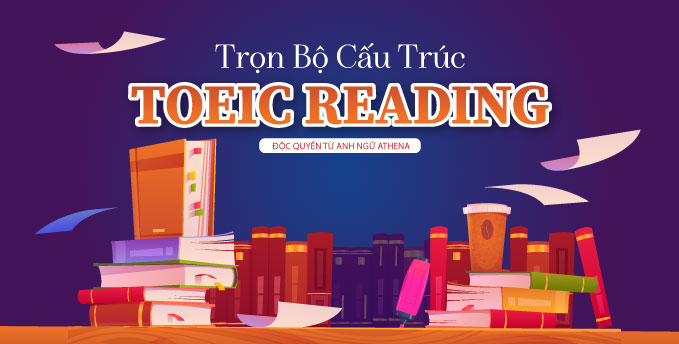
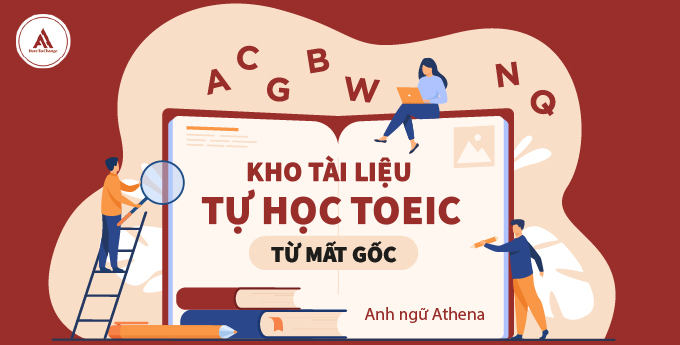



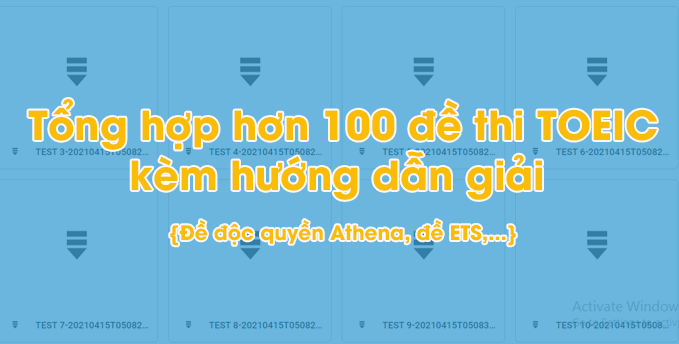





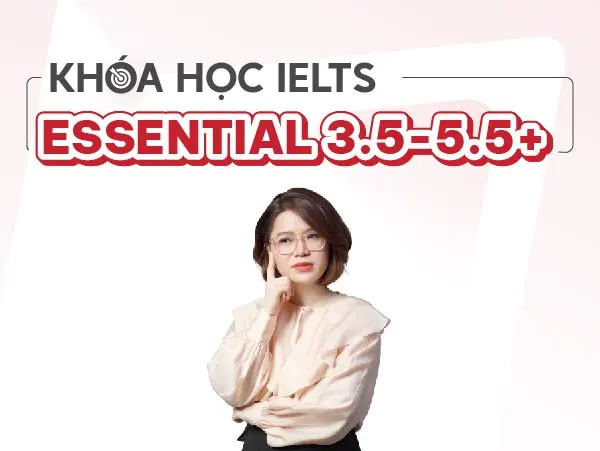
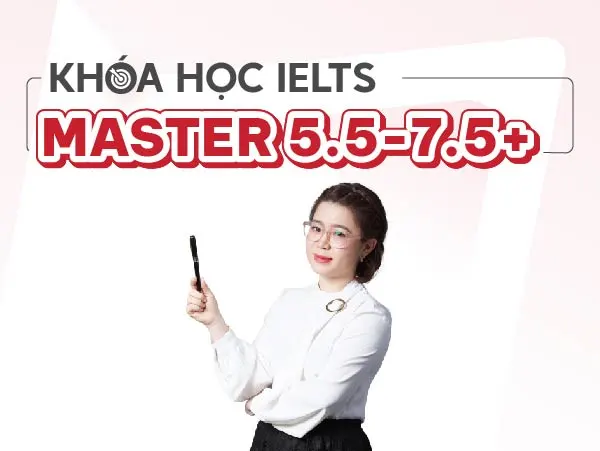
![[Cập nhật] Lịch thi TOEIC 2025 Quý 1 tại IIG Việt Nam](https://anhnguathena.vn/upload/ban-sao-cua-template-bai-viet-seo-6.png?v=1.0.0)

